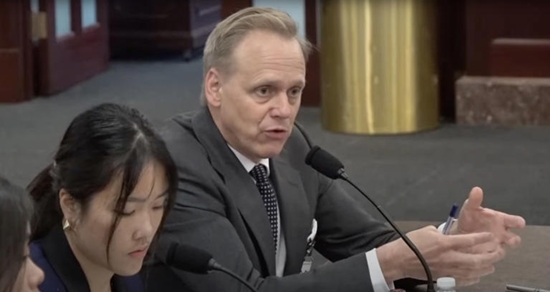
Appearing before the House Select Committee on the Chinese Communist Party, pro-democracy activist Frances Hui wanted to know why a bill to close three Hong Kong offices in the United States, HR 1103, hasn’t yet reached the floor (Radio Free Asia, May 24, 2024).
The United States should shutter Hong Kong’s foreign offices in Washington, D.C., New York and San Francisco and also revoke the jurisdiction’s special powers to clear U.S. dollar transactions, pro-democracy activists told Congress on Thursday.
The Hong Kong Economic and Trade Offices ostensibly serve to promote trade but in fact serve as intelligence outposts controlled by the Chinese government, the activists said at a roundtable hosted by the House Select Committee on the Chinese Communist Party.
The offices keep track of Hong Kongers who have fled a crackdown at home and must be “shut down, unless autonomy is restored to Hong Kong,” said Frances Hui, the policy and advocacy coordinator for the Committee for Freedom in Hong Kong Foundation, at the event.
Making the case for ending clearance of dollar transactions in Hong Kong was Jonathan Price (shown above), one of the lawyers for Jimmy Lai, the former publisher of the newpaper Apple Daily who has been in prison and is currently on trial in Hong Kong for criticizing China’s repression of Hong Kong.
Review and revisit
Price said that only four jurisdictions “are licensed to clear U.S. dollar transactions outside of the United States: Tokyo, Singapore, Manila and Hong Kong.
“That is a privilege that ought to be reviewed and revisited in light of the precipitous decline in the state of the rule of law. HSBC has a slightly colored history in closing down the accounts of pro-democracy campaigns at the behest of the Hong Kong government…
“Should the U.S. Treasury be rewarding huge financial institutions, and Hong Kong itself, with this sort of privilege in these circumstances?”
Radio Free Asia also reports that a critic of assaults on press freedom, Ronson Chan, won’t run for reelection as chair of the Hong Kong Journalists Association, having been told “that the organization would continue to be targeted by the authorities if he didn’t step down”; that a Hong Kong court has sentenced a dual Portuguese national, Joseph John, to five years in prison for leading a pro-independence political party registered in the United Kingdom; and that in March 2024, China’s state broadcaster reported the unanimous passage of Hong Kong’s new National Security Law by Hong Kong’s now rubber-stamp Legislative Council twenty minutes before lawmakers even began to vote.
Keeping an eye on
These are just a few indications of the Beijing-decreed tyranny that has descended on Hong Kong. Should this tyranny be facilitated by U.S. fiscal policy?
And should the United States allow Hong Kong’s Economic and Trade Offices—which Regina Ip, former Hong Kong secretary for security, says should be “keeping an eye on” anti-China activities, and which are in fact spying on Hong Kong activists living in exile in the United States—to operate on American soil?





